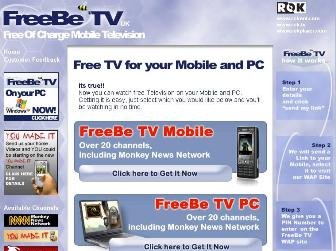First free mobile and IPTV service launched
ROK FreeBe TV offers free mobile and PC content

Sign up for breaking news, reviews, opinion, top tech deals, and more.
You are now subscribed
Your newsletter sign-up was successful
FreeBe TV, claimed to be the world's first free mobile and IPTV offering, has been launched by mobile communications and entertainment company ROK .
Users will have access to a 'wide variety' of content for viewing on WAP-enabled mobile phones (using any carrier) wherever they are in the world, as long as it is in an area with 2.5g GPRS coverage.
Users will have to pay network data charges on the content they download, if it's not bundled with a contract. Content can be watched on a PC free of charge, and can also be minimised to be viewed in quarter screen size. There's no need to open an internet browser or type in a web address each time you wish to access the service - it's effectively a TV on a PC.
ROK believes that consumers will only adapt to IPTV if content is free, and wants to strip away consumer reluctance to embrace such services.
"This is a major step forward in the convergence of TV, mobile and internet, and works towards delivering the consumer's holy grail - that being the content of their choosing delivered on their terms, in terms of location and time", said Jonathan Kendrick of ROK.
FreeBe TV currently offers 20 channels, including live news, music and sports, but ROK aims for FreeBe TV to offer close to 500 channels, on-demand and segmented by language and genre.
ABI Research believes the IPTV market could consist of 250 million people worldwide by 2010, representing a total market of $27bn (£14.4bn) per year. Anna Lagerkvist
Sign up for breaking news, reviews, opinion, top tech deals, and more.
Tech.co.uk was the former name of TechRadar.com. Its staff were at the forefront of the digital publishing revolution, and spearheaded the move to bring consumer technology journalism to its natural home – online. Many of the current TechRadar staff started life a Tech.co.uk staff writer, covering everything from the emerging smartphone market to the evolving market of personal computers. Think of it as the building blocks of the TechRadar you love today.